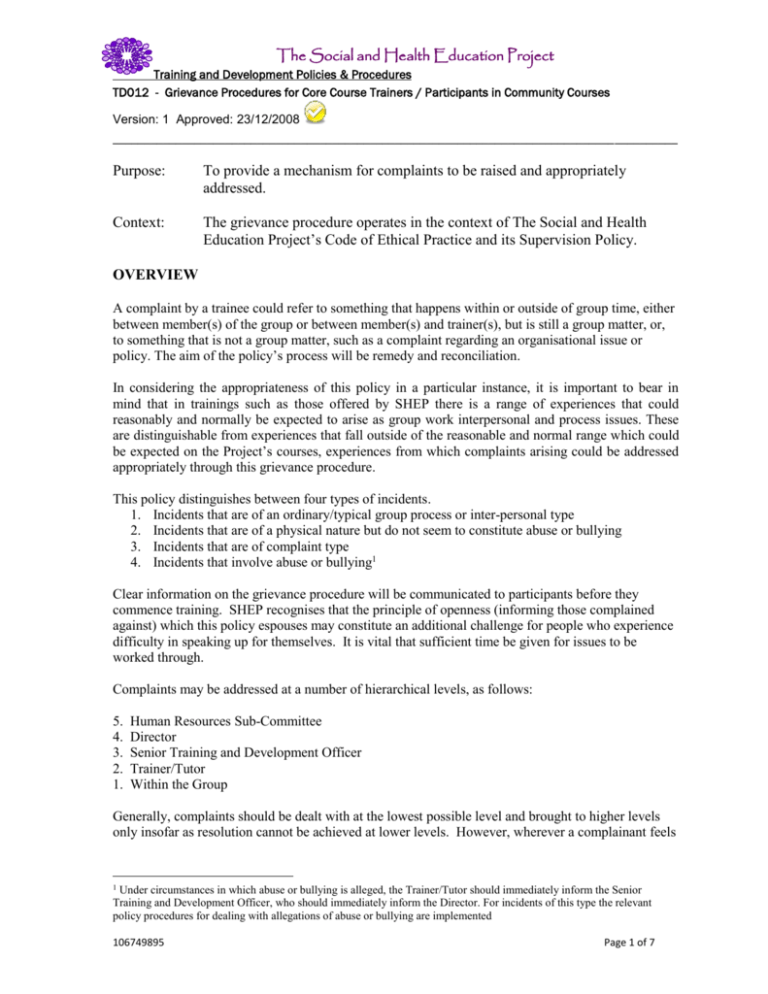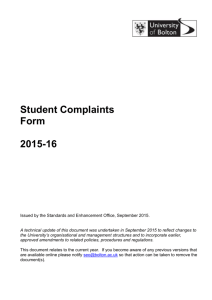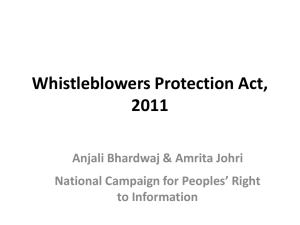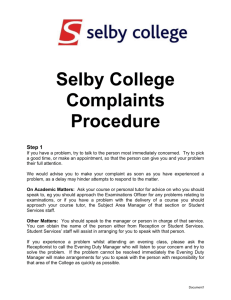TD012 Trainee Grievance Procedure Standing Policy (2008)
advertisement

The Social and Health Education Project Training and Development Policies & Procedures TD012 - Grievance Procedures for Core Course Trainers / Participants in Community Courses Version: 1 Approved: 23/12/2008 __________________________________________________________________________________________ Purpose: To provide a mechanism for complaints to be raised and appropriately addressed. Context: The grievance procedure operates in the context of The Social and Health Education Project’s Code of Ethical Practice and its Supervision Policy. OVERVIEW A complaint by a trainee could refer to something that happens within or outside of group time, either between member(s) of the group or between member(s) and trainer(s), but is still a group matter, or, to something that is not a group matter, such as a complaint regarding an organisational issue or policy. The aim of the policy’s process will be remedy and reconciliation. In considering the appropriateness of this policy in a particular instance, it is important to bear in mind that in trainings such as those offered by SHEP there is a range of experiences that could reasonably and normally be expected to arise as group work interpersonal and process issues. These are distinguishable from experiences that fall outside of the reasonable and normal range which could be expected on the Project’s courses, experiences from which complaints arising could be addressed appropriately through this grievance procedure. This policy distinguishes between four types of incidents. 1. Incidents that are of an ordinary/typical group process or inter-personal type 2. Incidents that are of a physical nature but do not seem to constitute abuse or bullying 3. Incidents that are of complaint type 4. Incidents that involve abuse or bullying1 Clear information on the grievance procedure will be communicated to participants before they commence training. SHEP recognises that the principle of openness (informing those complained against) which this policy espouses may constitute an additional challenge for people who experience difficulty in speaking up for themselves. It is vital that sufficient time be given for issues to be worked through. Complaints may be addressed at a number of hierarchical levels, as follows: 5. 4. 3. 2. 1. Human Resources Sub-Committee Director Senior Training and Development Officer Trainer/Tutor Within the Group Generally, complaints should be dealt with at the lowest possible level and brought to higher levels only insofar as resolution cannot be achieved at lower levels. However, wherever a complainant feels 1 Under circumstances in which abuse or bullying is alleged, the Trainer/Tutor should immediately inform the Senior Training and Development Officer, who should immediately inform the Director. For incidents of this type the relevant policy procedures for dealing with allegations of abuse or bullying are implemented 106749895 Page 1 of 7 The Social and Health Education Project Training and Development Policies & Procedures TD012 - Grievance Procedures for Core Course Trainers / Participants in Community Courses Version: 1 Approved: 23/12/2008 __________________________________________________________________________________________ unable - for whatever reason - to raise their complaint at any given level(s), s/he may take it to the next level beyond that at which s/he feels unable to express the grievance. DOCUMENTATION AND TIMESCALES Where a complaint is being formally taken to the next or a higher level, details of the complaint are to be documented and passed to the appropriate person at that level. At all levels, documentation will be checked with the parties involved and they will be given an opportunity to add/include important points of record for them. The Social and Health Education Project will be the custodian of all formal documentation associated with a Trainee Grievance Procedure and such documentation will in principle be accessible to all parties involved. Where possible the response timescales outlined in the policy will be followed. However, where for whatever reason the timescales are not adhered to, then the reasons for the deviation must be documented. LEVEL 1 –COMPLAINTS CONCERNING FELLOPW/OTHER PARTICIPATNS ADDRESSED AT GROUP LEVEL: Insofar as possible, complaints concerning other participants in a training or community group should be raised within the group and dealt with through dialogue, clarification of perspectives and constructive problem solving. Under circumstances in which a Trainee/Participant feels unable at first to raise and deal with such a complaint within the group, the complaint should instead be brought to the attention of the Trainer/Tutor. An initial response will be made, where possible, within one week. The trainer/tutor will give an opportunity to the complainant to air the issue, and will discuss it with her/him, and together they will generate suggestions in relation to the grievance issue. Ultimately the matter must be brought to the group, because that is the appropriate place to deal with issues, and because all parties have an equal right to know about a complaint. Insofar as possible, the Trainer/Tutor should support and give time to the complainant to bring the issue to the group. If for whatever reason the complainant cannot bring the matter to the group within a reasonable time, the Trainer/Tutor will do so. While a reasonable period of time will be allowed to enable the issue to be worked out, at a minimum the situation will be reviewed one month from the initial response. The support of a staff member(s) can be availed of to assist those involved to resolve the difficulty. If, having completed this step, the complainant is not satisfied with the outcome, the Trainer/Tutor should advise her/him of the option to address the complaint to the relevant Senior Training and Development Officer, and should complete documentation. Appropriate enhanced personal support can be arranged for the complainant if desired. The Trainer/Tutor should also immediately inform the relevant Senior Training and Development Officer (STDO) of the complaint. The STDO informs the Director. 106749895 Page 2 of 7 The Social and Health Education Project Training and Development Policies & Procedures TD012 - Grievance Procedures for Core Course Trainers / Participants in Community Courses Version: 1 Approved: 23/12/2008 __________________________________________________________________________________________ LEVEL 2 – TRAINER/TUTOR Insofar as possible, complaints concerning the practice of a Trainer or Tutor should be addressed, either within the group (as above), or through dialogue, clarification of perspectives and constructive problem solving with the Trainer/Tutor outside of the group setting. The Trainer/Tutor should offer appropriate personal support to the complainant during this process. In the case of there being a cofacilitator, this person is to be informed that a complaint has been made and they may be able to play a lead role in offering/providing support. An initial response will be made, where possible, within one week. The trainer/tutor and the cofacilitator will give an opportunity to the complainant to air the issue, and, will discuss it with her/him, and together they will generate suggestions in relation to the grievance issue. While a reasonable period of time will be allowed to enable the issue to be worked out, at a minimum the situation will be reviewed one month from the initial response. The support of a staff member(s) can be availed of to assist those involved to resolve difficulty. If, having completed this step, the complainant is not satisfied with the outcome, the Trainer/Tutor should advise her/him of the option to address the complaint to the relevant Senior Training and Development Officer and should complete documentation. Appropriate enhanced personal support can be arranged for the complainant if desired. The Trainer/Tutor should also immediately inform the relevant Senior Training and Development Officer of the complaint. The STDO informs the Director. LEVEL 3 – SENIOR TRAINING AND DEVELOPMENT OFFICER Where Level Three is the first point at which a complaint is lodged, summary details are to be recorded relating to the fact, description of the issue and suggestions made for dealing with the matter. As is the case for complaints that have come through earlier levels, the complainant will again be made aware that the other party referred to in the complaint has a right to be made aware of the matter. Insofar as possible, Senior Training and Development Officers should encourage and support complainants to deal with the issues involved through engagement with the group or the Trainer/Tutor concerned, or other persons(s), whomever is the focus of the complaint. Ideally the complainant themselves will bring the matter of their concern to the attention of the other party in an agreed time scale. However, where for whatever reason this does not happen, the Senior Training and Development Officer should inform the relevant Trainer/Tutor, or any person who is the focus of the complaint, of the nature of any complaint against them. They will also inform the Director that a grievance procedure has been invoked. The Senior Training and Development Officer will seek to establish the perspective of the Trainer/Tutor, or any person who is the focus of the complaint, in relation to the issue at stake. They will then seek to facilitate a reconciliation of perspectives and agreement as to how best to resolve the issue. Ideally, this would happen through a meeting of the Senior Training and Development Officer together with the respective parties, but it could also happen through one-to-one communication with the respective parties. 106749895 Page 3 of 7 The Social and Health Education Project Training and Development Policies & Procedures TD012 - Grievance Procedures for Core Course Trainers / Participants in Community Courses Version: 1 Approved: 23/12/2008 __________________________________________________________________________________________ An initial response will be made, where possible, within one week. The Senior Training and Development Officer will give an opportunity to the complainant to air the issue, and will discuss it with her/him, and together they will generate suggestions in relation to the grievance issue. While a reasonable period of time will be allowed to enable the issue to be worked out, at a minimum the situation will be reviewed one month from the initial response. If, having completed this step, the complainant is not satisfied with the outcome, the Senior Training and Development Officer should advise her/him of the option to address the complaint to the Director, and should complete documentation. Appropriate enhanced personal support can be arranged for the complainant if desired. The Senior Training and Development Officer should also immediately inform the Director of the complaint. In cases where the Senior Training and Development Officer considers there may have been a breach of good practice on the part of a Trainer/Tutor, he/she should immediately inform the Director, who, together with the Senior Training and Development Officer, will undertake a practice review and take/ recommend appropriate action. Level 4 – DIRECTOR At Level Four, participants making a complaint can call on an advocate/mediator of their choice to be a support to them in the process, either from a panel of SHEP advocates, or if necessary an independent advocate/mediator. The person appointed will be subject to the limits of confidentiality. Where Level Four is the first point at which a complaint is lodged, summary details are to be recorded relating to the fact, description of the issue and suggestions made for dealing with the matter. As is the case for complaints that have come through earlier levels, the complainant will again be made aware that the other party referred to in the query has a right to be made aware of the matter. Insofar as possible, the Director should encourage and support complainants to deal with the issues involved through engagement with the group, the concerned Trainer/Tutor, or the concerned Senior Training and Development Officer, or other persons(s), whichever is the focus of the complaint. Ideally the complainant themselves will bring the matter of their concern to the attention of the other party in an agreed time scale. However where this for whatever reason does not happen, the Director should inform the relevant Trainer/Tutor, Senior Training and Development Officer, or any person who is the focus of the complaint, of the nature of any complaint against them. They will also inform the Chairperson and the convenor of the Human Resource Sub-Committee that a grievance procedure has been invoked. The Director will seek to establish the perspective of the Trainer/Tutor, Senior Training and Development Officer, or any person who is the focus of the complaint, in relation to the issue at stake. The Director should also ascertain the view of all others involved in dealing with the grievance at different levels. The Director should then seek to facilitate a reconciliation of perspectives and agreement as to how best to resolve the issue. Depending on the circumstances, this might best happen through a meeting of the Director with all parties or through one-to-one communication with the respective parties. 106749895 Page 4 of 7 The Social and Health Education Project Training and Development Policies & Procedures TD012 - Grievance Procedures for Core Course Trainers / Participants in Community Courses Version: 1 Approved: 23/12/2008 __________________________________________________________________________________________ An initial response will be made, where possible, within one week. The Director will give an opportunity to the complainant to air the issue, and will discuss it with her/him, and together they will generate suggestions in relation to the grievance issue. While a reasonable period of time will be allowed to enable the issue to be worked out, at a minimum the situation will be reviewed one month from the initial response. If, having completed this step, the complainant is not satisfied with the outcome, the Director should advise her/him of the option to address the complaint to the Human Resources Sub-Committee, and should complete documentation. Appropriate enhanced personal support can be arranged for the complainant if desired. The Director should also immediately inform the Chairperson and the convener of the Human Resources Sub-Committee of the complaint. If the complainant has a complaint about the Director him/herself, the Director should advise them of the option to address their complaint to the Human Resources Sub-Committee. Appropriate enhanced personal support can be arranged for the complainant if desired. The Director should also immediately inform the Chairperson and the convener of the Human Resources Sub-Committee of the complaint. Level 5 – HUMAN RESOURCES SUB-COMMITTEE At Level Five, participants making a complaint can call on an advocate/mediator of their choice to be a support to them in the process, either from a panel of SHEP advocates, or if necessary an independent advocate/mediator. The person appointed will be subject to the limits of confidentiality. Insofar as is possible and practicable, identities of the parties involved are protected in discussion at this level. Where Level Five is the first point at which a complaint is lodged, summary details are to be recorded relating to the fact, description of the issue and suggestions made for dealing with the matter. As is the case for complaints that have come through earlier levels, the complainant will again be made aware that the other party referred to in the query has a right to be made aware of the matter. Insofar as possible, the Human Resources Sub-Committee should encourage complainants to deal with the issues involved through engagement with the group, the Trainer/Tutor concerned, the Senior Training and Development Officer concerned, or the Director, or other person(s), whomever is the focus of the complaint. Ideally the complainant themselves will bring the matter of their concern to the attention of the other party in an agreed time scale. However where for whatever reason this does not happen, the Human Resources Sub-Committee will inform the relevant Trainer/Tutor, Senior Training and Development Officer, Director, or any person who is the focus of the complaint, of the nature of any complaint against them. They will also inform the Chairperson that a grievance procedure has been invoked. The Human Resources Sub-Committee will seek to establish the perspective of the Trainer/Tutor, Senior Training and Development Officer, Director, or any person who is the focus of the complaint, in relation to the issue at stake. The Human Resources Sub-Committee should also ascertain the view of all others involved in dealing with the grievance at different levels. It should then seek to facilitate a reconciliation of perspectives and agreement as to how best to resolve the issue. Depending on the circumstances, this might best happen through a meeting of the Human Resources Sub-Committee with all parties or through separate interactions with the respective parties. 106749895 Page 5 of 7 The Social and Health Education Project Training and Development Policies & Procedures TD012 - Grievance Procedures for Core Course Trainers / Participants in Community Courses Version: 1 Approved: 23/12/2008 __________________________________________________________________________________________ An initial response will be made, where possible, within two weeks. The Human Resources SubCommittee will give an opportunity to the complainant to air the issue, and will discuss it with her/him, and together they will generate suggestions in relation to the grievance issue. While a reasonable period of time will be allowed to enable the issue to be worked out, at a minimum the situation will be reviewed one month from the initial response. The Human Resources Sub-Committee will maintain a written record of the process throughout. LIMITS OF CONFIDENTIALITY Each party (complainant and complained against) has an equal right to be fully informed about a complaint that has been made. Where complaint-related queries are lodged at the STDO level or higher, summary details are to be recorded relating to the fact, description of the issue and suggestions made for dealing with the matter. In such instances the complainant will again be made aware that the other party referred to in the query has a right to be made aware of the matter. The complainant in such an instance will be urged to deal with the matter appropriately (e.g. as a group issue and bringing it to the group, saying it to a facilitator, or at the appropriate level in a formal grievance process). Ideally the complainant themselves will bring the matter of their concern to the attention of the other party in an agreed time scale. However where this, for whatever reason, does not happen, the other party will be made aware of the matter by the STDO/person receiving the query. Confidentiality should be maintained within the hierarchy of SHEP agents/bodies responsible for responding to complaints or grievances – (i.e. by Tutors/Trainers, Senior Training and Development Officers, the Director, the Human Resources Sub-Committee and the Chairperson). Confidentiality boundaries and limits also extend to any advocate/mediator involved in the process and to any external bodies consulted by the Director/SHEP for advice. As necessary, support may be sought by these agents/bodies from the Training and Development Services Advisory Group in relation to policy questions arising from a complaint, provided that they do not name or otherwise identify either the complainant(s) or the individual(s) at the centre of the complaint. Similarly, support may be sought by individual agents from their professional supervisors in relation to practice questions arising from a complaint, provided that they do not name or otherwise identify either the complainant(s) or the individual(s) at the centre of the complaint. Wherever complaints concern allegations of bullying or abuse, those responding to the complaint must report it in accordance with the procedures set out above and follow the relevant policy procedures. The Director will be responsible for the sensitive and appropriate handling of such complaints. (If the complaint concerns the Director him/herself, the Chairperson will assume this responsibility). Where the complaint concerns abuse, the normal limits to confidentiality apply in accordance with statutory requirements of the law. 106749895 Page 6 of 7 The Social and Health Education Project Training and Development Policies & Procedures TD012 - Grievance Procedures for Core Course Trainers / Participants in Community Courses Version: 1 Approved: 23/12/2008 __________________________________________________________________________________________ Wherever a complaint is unresolved at any given level, those responding to the complaint must report it and document it in accordance with the procedures set out above, ensuring that identities are protected in documentation. Under circumstances in which a complainant threatens or takes legal action against SHEP or its agents/bodies, members of the Management Committee and the Board of Directors will be made privy to details of the complainant and of the nature of the complaint, as will the Project’s solicitor and any other professional agent working for the Project in the course of responding to the complaint. Revision History Date Change to Procedure 106749895 Version Signed Page 7 of 7







